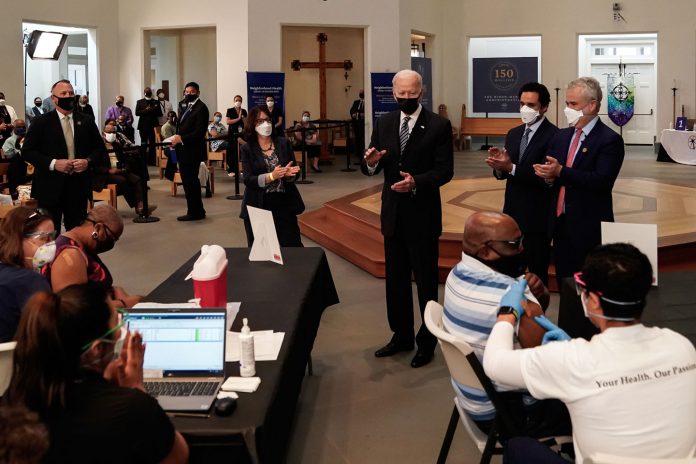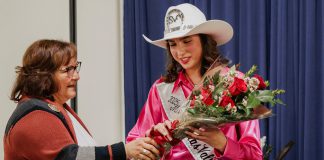
WASHINGTON — President Joe Biden on Tuesday moved up by two weeks, to April 19, his deadline for states to make every American adult eligible for coronavirus vaccination, following the lead of states around the country that are already meeting that timetable.
Biden’s announcement came as Americans and their elected officials were grappling with competing and seemingly contradictory forces. The pace of vaccinations is accelerating, but worrisome new variants are spreading. The death rate is declining, but caseloads and hospitalizations are on the rise.
California officials announced on Tuesday that they plan to lift all coronavirus restrictions on June 15, provided there are enough COVID-19 vaccines available for anyone age 16 or older and hospitalizations remain low and stable. Other states are already lifting restrictions, but Biden, in remarks at the White House, warned against throwing off the guardrails too soon.
“The virus is spreading because we have too many people who, seeing the end in sight, think we’re at the finish line already,” the president said. “But let me be deadly earnest with you: We aren’t at the finish line. We still have a lot of work to do. We’re still in a life-and-death race against this virus.”
The president also reiterated and made explicit his pledge to give surplus vaccine to other countries, once he is certain there is enough for people in the United States.
Not quite a month ago, Biden set a deadline of May 1 for states to open up vaccination to all adults. A week after that, he said that by April 19, 90% of adults would be eligible for a shot and would be able to get one within 5 miles of their home.
Since then, nearly every state in the nation has accelerated its vaccination program, and the vast majority are now meeting or coming in ahead of the April 19 target. On Tuesday, Oregon said those 16 or older will be eligible for vaccination on April 19.
At least 530 new coronavirus deaths and 76,624 new cases were reported in the United States on Monday, according to a New York Times database. Over the past week, there has been an average of 64,855 new cases per day, an increase of 20% from the average two weeks earlier.
That has put the country in a tenuous situation, with public health officials, including Dr. Rochelle Walensky, the director of the Centers for Disease Control and Prevention, pleading with governors not to lift restrictions and with citizens to continue to follow social distancing guidelines, wear masks and take other public health precautions. Last week, Walensky said she felt a sense of “impending doom” from a potential fourth surge of the pandemic.
But in California, cases have been declining since hitting a peak early this year, with the state now averaging around 2,700 new cases a day, the lowest figure since June. The CDC said that, as of Tuesday, 35% of the state’s total population had received at least one vaccine shot, and 18% were fully vaccinated.
“With more than 20 million vaccines administered across the state, it is time to turn the page on our tier system and begin looking to fully reopen California’s economy,” Gov. Gavin Newsom, a Democrat, said in a statement. “We can now begin planning for our lives post-pandemic.”
Many public health experts say that the nation is in a race between the vaccines and the variants and that, for the moment at least, the vaccines appear to have the upper hand. But public health officials are worried that future iterations of the virus may be more resistant.
At the same time, they are watching an uptick in cases among young people, particularly those ages 18 to 24. Walensky told reporters on Monday that the CDC was working with states to investigate outbreaks in young people that she said may be related to extracurricular activities or sports.
Biden spoke on Tuesday after visiting a vaccination clinic at the Virginia Theological Seminary in Alexandria, Virginia, which is working with community health centers to offer inoculations. Making the rounds of the makeshift clinic, he showed flashes of his old self — the sunny retail politician who likes to get close to people, with a pat on the arm or a squeeze on the shoulder.
“He’s gonna be hard — he’s got so much muscle mass there,” the president joked to a nurse as he squeezed the shoulder of a muscular man who was about to get his shot. “I tell you what, I could have been an All-American if I had those.”
But his lightness belied the seriousness of the message he would later deliver at the White House. There, he marked a milestone: Since Biden has been in office, more than 150 million COVID-19 shots have been administered to Americans, which puts the nation on track to reach his goal of 200 million shots by his 100th day in office, at the end of this month.
“We’ve vaccinated more people than any other nation on Earth,” the president said. “The vaccines have proven to be safe and effective. That should give us real hope.”
But, he added, “we can’t let it make us complacent.”
Copyright 2021 The New York Times Company













